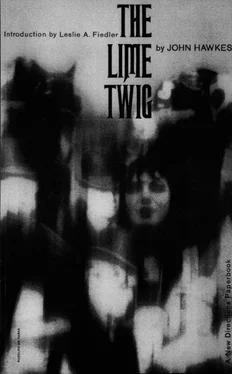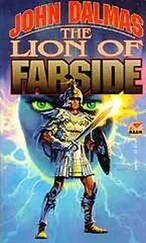And the end of it all is sheer terror: Hencher kicked to a pulp in a stable; Margaret Banks naked beneath the shreds of a hospital gown and lovingly beaten to death; Michael, screwed silly by all his nympholeptic dreams become flesh, throwing himself under the hooves of a field of horses bunched for the final turn and the stretch! What each of Hawkes’ doomed lovers has proposed to himself in fantasy — atrocious pleasure or half-desired indignity — he endures in fact. But each lover, under cover of whatever images, has ultimately yearned for his own death and consequently dies; while the anti-lovers, the killers, whose fall guys and victims the lovers become, having wished only for the death of others, survive: Syb, the come-on girl, tart and teaser; Little Dora, huge and aseptically cruel behind her aging school-marm’s face; and Larry, gangster-in-chief and cock-of-the-house, who stands stripped toward the novel’s end, indestructible in the midst of the destruction he has willed, a phallic god in brass knuckles and bulletproof vest.
They cheered, slapping the oxen arms, slapping the flesh, and cheered when the metal vest was returned to him — steel and skin — and the holster was settled again but in an armpit naked now and smelling of scented freshener.
Larry turned slowly round so they could see, and there was the gun’s blue butt, the dazzling links of steel the hairless and swarthy torso. …
“For twenty years,” shouted Dora again through the smoke opaque as ice, “for twenty years I’ve admired that! Does anybody blame me.” Banks listened and … for a moment met the eyes of Sybilline, his Syb, eyes in a lovely face pressed hard against the smoothest portion of Larry’s arm, which — her face with auburn hair was just below his shoulder — could take the punches …
And even these are bound together in something like love.
Of all the hook’s protagonists, only Sidney Slyter is without love; half dopester of the races, half amateur detective, Sidney is at once a spokesman for the novelist and a parody of the novelist’s role, providing a choral commentary on the action, which his own curiosity spurs toward its end. Each section of the novel opens with a quotation from his newspaper column, Sidney Slyter says , in which the jargon of the sports page merges into a kind of surrealistic poetry, the matter of fact threatens continually to become hallucination. But precisely here is the clue to the final achievement of Hawkes’ art, his detachment from that long literary tradition which assumes that consciousness is continuous, that experience reaches us in a series of framed and unified scenes, and that — in life as well as books — we are aware simultaneously of details and the context in which we confront them.
Such a set of assumptions seems scarcely tenable in a post-Freudian, post-Einsteinian world; and we cling to it more, perhaps, out of piety toward the literature of the past than out of respect for life in the present. In the world of Hawkes’ fiction, however, we are forced to abandon such traditional presumptions and the security we find in hanging on to them. His characters move not from scene to scene but in and out of focus; for they float in a space whose essence is indistinctness, endure in a time which refuses either to begin or end. To be sure, certain details are rendered with a more than normal, an almost painful clarity (quite suddenly a white horse dangles in mid-air before us, vividly defined, or we are gazing close up, at a pair of speckled buttocks), but the contexts which give them meaning and location are blurred by fog or alcohol, by darkness or weariness or the failure of attention. It is all, in short, quite like the consciousness we live by but do not record in books — untidy, half-focused, disarrayed.
The order which retrospectively we impose on our awareness of events (by an effort of the will and imagination so unflagging that we are no more conscious of it than of our breathing) Hawkes decomposes. For the sake of art and the truth, he dissolves the rational universe which we are driven, for the sake of sanity and peace, to manufacture out of the chaos of memory, impression, reflex and fantasy that threatens eternally to engulf us. Yet he does not abandon all form in his quest for the illusion of formlessness; in the random conjunction of reason and madness, blur and focus, he finds occasions for wit and grace. Counterfeits of insanity (automatic writing, the scrawls of the drunk and doped) are finally boring; while the compositions of the actually insane are in the end merely documents, terrible and depressing. Hawkes gives us neither of these surrenders to unreason but rather reason’s last desperate attempt to know what unreason is; and in such knowledge there are possibilities not only for poetry and power but for pleasure as well.
Goshen, Vermont
June, 1960
SIDNEY SLYTER SAYS
Dreary Station Severely Damaged During Night …
Bomber Crashes in Laundry Court …
Fires Burning Still in Violet Lane …
Last night Blood’s End was quiet; there was some activity in Highland Green; while Dreary Station took the worst of Jerry’s effort. And Sidney Slyter has this to say: a beautiful afternoon, a lovely crowd, a taste of bitters, and light returning to the faces of heroic stone — one day there will be amusements everywhere, good fun for our mortality, and you’ll whistle and flick your cigarette into an old crater’s lip and with your young woman go off to a fancy flutter at the races. For Sidney Slyter was recognized last night. The man was in a litter, an old man propped up in the shelter at Temple Place. I pushed my helmet back and gave him a smoke and all at once he said: “You’ll write about the horses again, Sidney! You’ll write about the nags again all right…” So keep a lookout for me. Because Sidney Slyter will be looking out for you. …
Have you ever let lodgings in the winter? Was there a bed kept waiting, a comer room kept waiting for a gentleman? And have you ever hung a cardboard in the window and, just out of view yourself, watched to see which man would stop and read the hand-lettering on your sign, glance at the premises from roof to little sign — an awkward piece of work — then step up suddenly and hold his finger on your bell? What was it you saw from the window that made you let the bell continue ringing and the bed go empty another night? Something about the eyes? The smooth white skin between the brim of the bowler hat and the eyes?
Or perhaps you yourself were once the lonely lodger. Perhaps you crossed the bridges with the night crowds, listened to the tooting of the river boats and the sounds of shops closing on the far side. Perhaps the moon was behind the cathedral. You walked in the cathedral’s shadow while the moon kept shining on three girls ahead. And you followed the moonlit girls. Or followed a woman carrying a market sack, or followed a slow bus high as a house with a saint’s stone shadow on its side and smoke coming out from between the tires. Then a turn in the street and broken glass at the foot of a balustrade and you wiped your forehead. And standing still, shoes making idle noise on the smashed glass, you took the packet from inside your coat, unwrapped the oily paper, and far from the tall lamp raised the piece of hot white fish to your teeth.
You must have eaten with your fingers. And you were careful not to lick your lips when you stepped out into the light once more and felt against your face the air waves from the striking of the clock high in the cathedral’s stone. The newspaper — it was folded to the listings of single rooms — fell from your coat pocket when you drank from the bottle. But no matter. No need for the rent per week, the names of streets. You were walking now, peering in the windows now, looking for the little signs. How bloody hard it is to read hand-lettering at night. And did your finger ever really touch the bell?
Читать дальше












